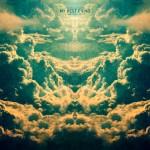
My Best Fiend In Ghostlike Fading
(Warp)
Initially My Best Fiend is just another forgettable Brooklyn indie band to be described with words such as “dreamy” and “hypnotic”; thankfully, they are capable of showing genuine emotion and warm melodies that can stand up repeated listens, showing that the strengths of My Best Fiend exist in the songs themselves, not the atmosphere. That is not to say that their debut, In Ghostlike Fading lacks an alluring atmosphere; on the contrary, the ethereal keyboard lines and the chemistry between the two guitars are able to trap a listener within the album right from the start, and it rarely lets you stray too far from the music.
The first two tracks are fairly standard fare: The beginning is, yes, dreamy, in tone, but contains a texture that is surprisingly lucid; the chorus is bigger and slightly explosive, and the bridge is, first and foremost, an opportunity for a guitar solo, not a spacey display of white-noise or layers of instruments. Indeed, My Best Fiend’s fondness of classic rock shows itself more prominently than any contemporary influences in song structures, and it persists through most of the album, including the highlights. But still, the band’s ability to contrast acoustic or low-gain, clean guitars with distorted and noisy, purposeful droning is always apparent. Somewhat unsurprisingly, the biggest departure from this pattern (but also the only song to make full use of each piece of the puzzle) is also the album’s biggest success. Running at just over seven-and-a-half minutes, O.D.V.I.P. features cryptic lyrics, highlighted by an understatedly threatening claim, “Today you can borrow/but tomorrow you gotta pay,” with a crescendo of increasingly complex drum rhythms, effervescent keyboards, rollicking, melodic bass, and versatile, contrasting guitar lines to create a daring collage of melodic noise that twists and exploits expected dynamic contrasts and verse-chorus structure.
It’s unfortunate that My Best Fiend does not reach that level of confidence and courage on any other song, but O.D.V.I.P. is still only the first in a line of noteworthy tracks. One Velvet Day contains some of the best guitar work on the record, including a buried, screaming guitar solo trying to break free from entrapments that vocalist-lyricist Fred Coldwell promises won’t be present tomorrow. The mixing is not what one would expect, but for the dim-hoped plea Coldwell offers, it’s a perfect fit. Next, In Ghostlike Fading stands out for its melancholic, dreamy keyboard lines, and the most apt metaphor on the album, the title line being a perfect description of a relationship that, although you can envision it living, is, if not dead, certainly dying. Unfortunately, it’s the type of beauty that sounds like it is desperately trying to work on the album but is often unable to sustain the eerie, understated simplicity it has here. Attempts are less successful on the latter half of the album, and the only cure seems to be offsetting the attempts with an unrestrained boldness the band gives us on Cracking Eggs but nowhere else.
My Best Fiend is clearly willing to dabble in new approaches, with Cool Doves’ sustained running time resulting in a harmonica outro, and I’m Not Going Anywhere starting with a cello that inexplicably disappears just as we get interested but before it offers anything noteworthy. The experiments cannot, however, disguise the static production or the melodramatic and sentimental lyrics, whose nice imagery is few and far between. Instead, the lack of true adventure and confidence displayed in O.D.V.I.P., and, to a lesser extent, Cracking Eggs, are absent from the album. The strings are used far too sparsely, and by the end of the album, even the melodies sound a little bit tired, as if the beauty has had no chance to rest. And indeed, it hasn’t. While this is often times a good thing, when it comes in doses this large, the versatility that is hinted at but never truly displayed becomes the difference between a good album and a great one.
22 February, 2012 - 16:35 — Forrest Cardamenis